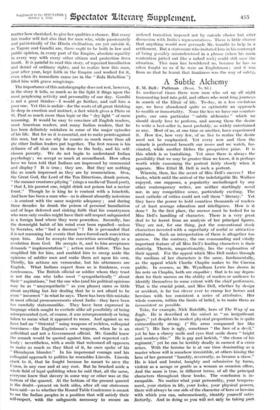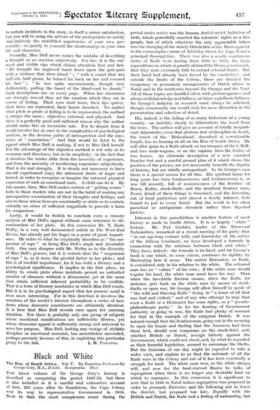A Subtle Alchemy
E. M. Dell : Pullman. (13enn. 7s. 9d.) IN mediaeval times there were men who sat up all night transmuting lead into gold, and others who went long journeys in search of the Elixir of life. To-day, in a less credulous age, we have abandoned quite so optimistic an approach to wealth or immortality. None the less we have our counter- parts, our own particular "subtle alchemies" which we should dearly love to perform, and among them the desire to write a best-seller is, most probably, as widely entertained as any. Most of us, at one time or another, have experienced it. How few, how very few, of us live to realize the desire need not be emphasized. Yet every now and then the miracle is performed beneath our noses and we watch, fas- cinated, while another filches the prospective prize. It is this which is so tantalizing. Yet since there is always the possibility that we may be greater than we know, it is perhaps worth while examining the portent fairly closely when it appears. Miss Ethel M. Dell is such a portent.
Wherein, then, lies the secret of Miss Dell's success ? Her books, which until the arrival of the indefatigable Mr. Wallace enjoyed, one supposes, a popularity unchallenged by any other contemporary writer, are neither startlingly novel nor, in any competitive sense, particularly exciting. The most catholic of critics could not call them "literary." Yet they have the power to hold countless thousands of readers of at least average education and intelligence. How is it done ? In the first place, the answer must be looked for in Miss Dell's handling of character. There is a very great deal to be learnt from an analysis of her principal figures. They are not, for one thing, just the conventional stock characters invested with a superfluity of useful or attractive attributes. Such an interpretation of them is altogether too narrow. On the contrary, the one commanding and vitally important feature of all Miss Dell's leading characters is their elasticity. Therein, unquestionably, lies the explanation of their appeal. For the appeal which Miss Dell makes through the medium of her characters is the same, fundamentally, as the appeal which Charlie Chaplin makes to the Cinema public. In essence, as Mr. Wyndham Lewis has shown in his note on Chaplin, both are empathic ; that is to say depen- dent for their success on the ability of readers or audience to identify themselves to some extent with the chief performers. That is the crucial point, and Miss Dell, whether by design or accident, is far too clever ever to cramp her heroes and heroines with too consistent a series of attributes. Her whole concern, within the limits of belief, is to make them as inconsistent as possible.
Take, for example, Nick Ratcliffe, hero of The Way of an Eagle. He is described at the outset as "an insignificant figure," yet despite his modest physical proportions he is quite extraordinarily strong. (" His arms compassed her like steel.") His face is ugly, sometimes "the face of a devil," yet he has a cheery smile and eyes that smile down "bright and monkey-like." He is gay and larkish, "the clown of his regiment," yet he can be terribly deadly in earnest if a crisis arises. With the heroine he is at one time dominating as a master whose will is somehow irresistible, at others kissing the hem of her garment "humbly, reverently, as became a slave." He is kind and brutal, haughty and submissive by turns, violent as a savage or gentle as a woman as occasion offers. And the same is true, in different terms, of all the principal characters throughout these books. The conclusion is in- escapable. No matter what your personality, your tempera- ment, your station in life, your looks, your physical powers, there will always be one side of the character of hero or heroine with which you can, subconsciously, identify yourself satis- factorily,. And in doing- so you will not only be taking part
in certain incidents in the story, in itself a minor satisfaction, but you will be using the actions of the protagonists to satisfy ;ma linatively the unfulfilled appetencies of your own per- sonality—to justify to yourself the shortcomings in your own life and character.
Secondly, Miss Dell never makes the mistake of describing a thought or an emotion subjectively. For her, it is the out- ward and visible sign which claims attention first and last. " He brought his ungloved hand down upon the gate-post with a violence that drew blood " ; "with a sound that was half-sob, half groan, he turned his back on her and covered his face " ; "he was quite unconsciously, though very deliberately, pulling the tassel of the blind-cord to shreds." Such descriptions are on every page. When her characters are strongly moved they act the emotion which they are in course of feeling. Their eyes start tears, their lips quiver, their faces are contorted, their hands clenched. No matter what pitch or grade of feeling is to be represented, the method is always the same ; objective, external, and physical. And there is a perfectly good and sufficient reason why the author should make this an invariable rule. For to depart from it would involve her at once in the complexities of psychological analysis, in the devious paths of introspection and the mys- teries of "association." And that would be fatal to the appeal which Miss Dell is making, if not to Miss Dell herself. For the advantage of the objective method is not only in its economy and directness, but in its simplicity—in the fact that it absolves the reader alike from the necessity of experience, and from the necessity of recollecting experience subjectively. That is its real strength. It is clearly not necessary to have oneself experienced (say) the uttermost limits of anger and hatred, in order to recognize or imagine the outward physical expression of such an emotional state. A child can do it. By this means, then, Miss Dell makes certain of" getting across" both to those readers who are not in the habit of making any introspective examination of their thoughts and feelings, and also to those whose lives are emotionally so static as to contain virtually no crises of sufficient magnitude to provide a basis for comparison.
Lastly, it would be foolish to conclude even a cursory analysis of Miss Dell's appeal without some reference to the construction of her plots. In this connexion Mr. T. Earle Welby, in a very well documented article in The Week-End Review, has already put his finger on a point of great import- ance. He refers to what he cryptically describes as "the sus- pension of rape" as being Miss Dell's single and invariable trick. One may disagree with Mr. Welby as to the diversity of Miss Dell's powers, but it is certain that the "suspension of rape" is, as it were, the pivotal factor in her plots ; and this is of twofold importance, for it has both a literary and a psychological significance. It implies in the first place, an ability to create plots whose incidents permit an unlimited number of climaxes withbut a denouement, yet at the same time retain sufficient inherent probability to be credible. That is a form of literary acrobatics in which Miss Dell excels. But it is in its psychological aspect that her premier motif is even more interesting. For in this direction it involves the retention of the reader's interest throughout a series of inci- dents whose dramatic constituents are ultimately identical. It is here that Miss Dell reveals once again her unerring intuition. For there is probably only one group of subjects whose emotional ramifications are sufficiently diverse, yet whose elemental appeal is sufficiently strong and universal to serve her purpose. Miss Dell, lacking any vestige of stylistic discipline or emotional restraint, has nevertheless succeeded, perhaps precisely because of this, in exploiting this particular





















































 Previous page
Previous page